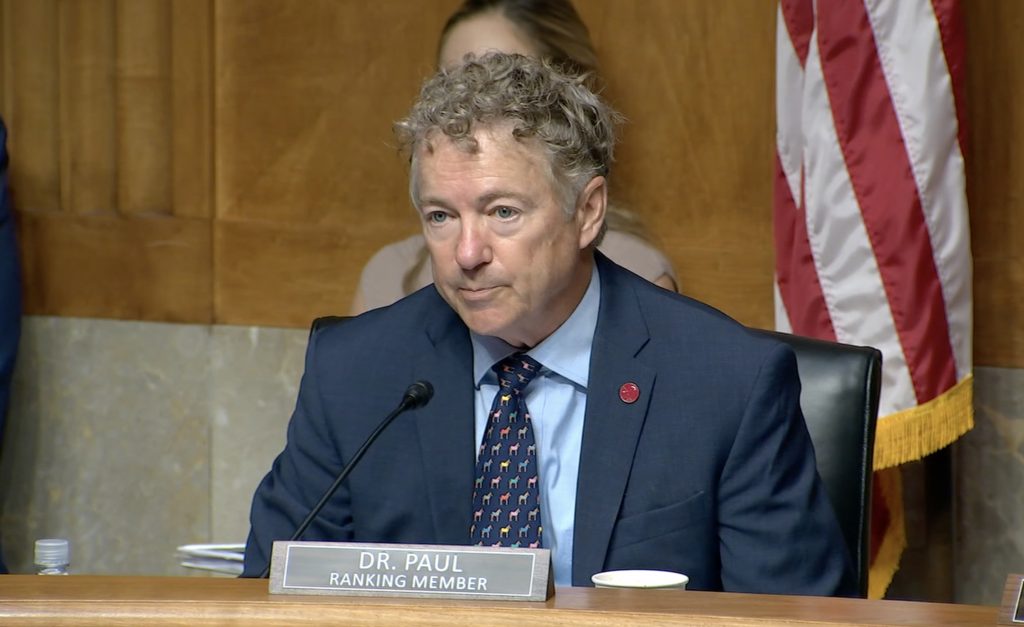WASHINGTON, D.C. – Today, U.S. Senator Rand Paul (R-KY), Ranking Member of the Senate Homeland Security and Governmental Affairs Committee, discussed the dangers presented by the ability of the President to grant himself extraordinary emergency powers that threaten the rule of law and individual rights. During a hearing entitled “Restoring Congressional Oversight Over Emergency Powers: Exploring Options to Reform the National Emergencies Act,” Dr. Paul called on Congress to pass a comprehensive reform bill that would allow the President to immediately respond to emergency situations, while protecting Americans’ civil liberties from an unchecked executive branch.
In the hearing, Dr. Paul highlighted several instances of Presidents from each party abusing emergency powers, such as those authorized by the International Emergency Economic Powers Act (IEEPA). Dr. Paul expressed concerns over IEEPA, the most frequently used emergency power which grants the President exceptionally broad authority to freeze the assets and block transactions of a targeted individual or entity. Using IEEPA, the President could target American citizens to freeze their bank accounts and leave them powerless to provide for their families, all without due process of law. Dr. Paul also drew attention to a provision of the 1934 Communications Act that allows the President to shut down or take control of the entire U.S. communications infrastructure, including the internet. Dr. Paul stressed the need for a bipartisan effort in Congress to reform the Executive Branch’s emergency powers and ensure potential abuses of power don’t go unchallenged.
Dr. Paul recently introduced the REPUBLIC Act to rein in the blank check of power presidents grant themselves in self-declared emergencies. Under the National Emergencies Act of 1976, the President currently has the unilateral authority to determine when extraordinary powers not permitted during normal operations can be unlocked and exercised. To address this unchecked power, the REPUBLIC Act will mandate congressional oversight of national emergencies and executive actions that threaten the rights and liberties of the American people while still allowing the President to act swiftly during crises.

View the Ranking Member’s opening statement here, part one of his questioning here and part two here.
Opening remarks as prepared below:
In 1867, a journalist named Walter Bagehot explained that in Britain, the monarchy and the House of Lords no longer exercised true governing authority, that the real work, the real power, of government was done by the House of Commons and the Prime Minister.[1]
In contrast, the United States has allowed the majority of governing power to remain in the executive branch.
In some ways, the United States of America is a monarchy in disguise. The United States maintains the veneer of a constitutional republic but often operates as an elected monarchy in which the President exercises awesome and unchecked power by decree.
Today, the President can unilaterally determine when and how to unlock and exercise extraordinary powers not permitted during normal operations. Once the President simply declares an emergency, emergencies are rarely terminated. The national emergency declared in reaction to the 1979 Iranian hostage crisis is still in effect to this day.
Some powers are so inimical to the concept of a constitutional republic that they should never have been granted to the President in the first place.
One such emergency power pursuant to the Communications Act of 1934 gives the President nearly unchallenged authority to restrict access to the internet, conduct email surveillance, and control computer systems, television and radio broadcasts, and cell phones. President Woodrow Wilson used a similar power three times during World War I. Written for a different time, this power, which some refer to as the “Internet Kill Switch,” threatens the rights protected by the First and Fourth Amendments as well as property rights simply by declaring an emergency.
This dangerous imbalance of the constitutional separation of powers is not simply aggrandizement by the Executive Branch. Congress has been complicit and made itself a feckless branch of the federal government by granting the President so many emergency powers and refusing to regularly vote on the termination of national emergencies as required by current law.
We do not have to accept as an inevitability the degeneration of a republic into rule by an all-powerful executive. We do not have to be a monarchy disguised as a republic. It is time the Congress restore itself as the first among equals of the branches of government as envisioned in the Constitution. I hope this hearing marks only the beginning of a serious and sustained effort to restore the Constitution, reclaim the authority of Congress, and protect the liberties of the people by pairing back the vast emergency powers delegated to the President.
###
[1] Michael J. Glennon, National Security and Double Government, 5 Harv. Nat’l Sec. J. 1 (2014)